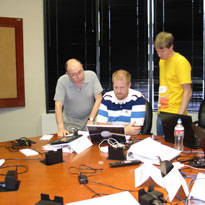Diameter Protocol
- Course:Diameter Protocol
- Course ID:DIAMETER Duration:4 days Where: Your Office (7+ Persons)
- Download Course Description (PDF)
Available as a private, customized course for your group at your offices or ours and in some cases as a WebLive(TM) class.
Course Outline
- The 3GPP Evolved Packet Core
- Why Change the UMTS Core
- Migration of the Core from 3GPP Rel. 4 to Rel. 8
- 3GPP EPC Architecture, Components, Interfaces and Reference Points
- IMS-based Service Delivery
- Policy and QoS
- Definitions and Attributes of QoS
- Enforcing QoS at the Bearer
- Subscriber QoS Profiles and Parameters
- Resource-based or Session-based QoS
- Multi-Domain QoS Control
- The 3GPP QoS Architecture, Components, and Reference Points
- Charging Principles
- Principles of Charging
- Generic Charging Components: OFCS; OCS; PCEF; PCRF
- Offline Charging Subsystem (OFCS): Components, Reference Points, Procedures
- Online Charging Subsystem (OCS): Components, Reference Points, Procedures
- IMS Charging
- Levels of Charging: Bearer; Subsystem; Service
- Data Correlation between Levels
- Utilization of Charging Information
- Policy and Charging Control (PCC): Components; Procedures When Roaming/Not Roaming
- Charging Procedures for Different Access Networks
- Diameter and Its Applications
- The Need for Diameter
- The Diameter Document Set
- Diameter Applications
- The 3GPP Use of Diameter
- Supporting Diameter
- Diameter Needs Network and Transport Layer Support
- TCP Usage and Its Vulnerabilities
- Stream Control Transmission Protocol (SCTP)
- Improvements over TCP
- Security at Startup, Multi-homing, and Multi-streaming
- SCTP Message Headers and Operation
- The Diameter Base Protocol (RFC 6733)
- Terminology
- Diameter Agents and Diameter Routing
- Peer Connections: Discovery, Session Establishment, Capability Exchange, Disconnection
- Failover and Fallback
- Security
- Features
- Message Structure
- Header Format
- Command Codes and Their Associated Procedures
- CER/CEA, DWR/DWA, DPR/DPA, RAR/RAA, ASR/ASA, ACR/ACA, STR/STA
- Attribute Value Pairs (AVPs)
- AVP Header
- Grouped AVPs
- Base Protocol AVPs
- Diameter Error Handling
- Decoding Diameter Messages Using Wireshark
- Offline Charging and Diameter Accounting
- Offline Charging Model
- Components: CTF, CDF, CGF
- The Rf, Ga, and Bx Reference Point
- Accounting Records and Call Detail Records
- Event-based and Session-based Charging
- Diameter Accounting Messages and AVPs
- Message Flows and Message Contents
- Understanding the AVP Parameters
- Interpreting Captured Traces over the Rf Interface
- Online Charging and the Diameter Credit Control Application (RFC 4006)
- Online Charging Model
- Components: CTF, OCF
- The Ro Reference Point
- The Online Charging Subsystem: ABMF, RF
- The Rc and Re Reference Points
- The Rating Function Operation
- The Account Balance Management Function
- Credit Control Procedures
- The Need to support CDRs in an OCS for Accountability
- Event-based and Session-based Charging
- Direct Debit and Unit Reservation
- Diameter Credit Control Application (RFC 4006)
- DCCA Messages and AVPs
- DCCA Message Flows and Message Contents
- Understanding the AVP Parameters
- LTE/SAE Charging Management Architecture
- IMS Charging Architecture and Operation
- Charging Application Message Sequence Examples
- Interpreting Captured Wireshark Traces
- Policy and Charging Control (PCC)
- 3GPP PCC Architecture
- Functions of the PCRF
- Functions of the PCEF
- Functions of the SPR
- Functions of the AF
- Policy Control Principles and Procedures
- Flow-based Charging and IMS
- Charging Rules Data
- Scenario Examples
- Interpreting Captured Wireshark PCC Messages
- Packet Data Charging
- Establishing, Modifying, and Terminating PDP Contexts
- Policy Charging Rules
- Service-based Local Policy
- Charging Operations
- Establishing Flow-based Charging
- Wrap-up
- Course Recap and Q/A
- Evaluations
Course in a Nutshell
This hands-on workshop provides an in-depth study of the 3GPP PCC functionality, the structure of the Diameter Base Protocol, and Diameter Applications to ensure full understanding of the PCC and Diameter operation and implementation.
You will undertake a detailed study of all relevant protocols and how they work with rating and charging systems. You will examine procedures using structured scenarios, supported by message flow sequences. For a more complete understanding, we will also interpret Wireshark captured message flow traces. Course materials include a full glossary of terms, relevant protocol specifications (RFCs, etc.), and copies of Wireshark trace files to help you remember and retain the knowledge acquired in this workshop and apply it in your job
Learn How To
- Understand the architecture of the 3GPP Evolved Packet Core and IMS
- Understand and describe the role of Diameter in LTE/EPC and IMS
- Describe the features of the Diameter Base Protocol
- Describe the features of Diameter Applications
- Understand and describe the requirements of offline and online charging systems
- Understand and describe Policy and Charging Control
- Interpret captured Diameter messages using Wireshark
Customize It!
- We can customize the course to your technical requirements.
- A three-day version, with some topics (selected by you) removed and analysis of fewer Wireshark captures, is available.
- A one-day ‘Diameter Highlights’ course is also available.
Aimed At
Those whose job requires knowledge of the next generation of Authentication, Authorization and Accounting (AAA) protocols.
Prerequisites
Prior knowledge of data communications and IP networks will be helpful but not required.

